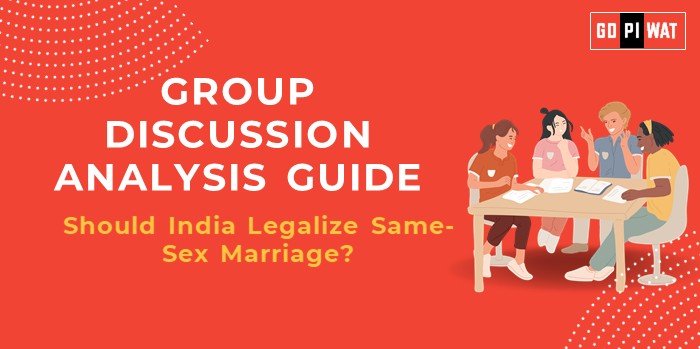📋 Group Discussion (GD) Analysis Guide: Should India Legalize Same-Sex Marriage?
🌐 Introduction to the Topic
- 💬 Opening Context: Globally, over 30 countries, including the USA, Canada, and several European nations, have legalized same-sex marriage, showcasing a growing recognition of LGBTQ+ rights. In India, the debate around same-sex marriage has intensified post the Supreme Court’s landmark decision to decriminalize homosexuality in 2018.
- 📜 Topic Background: The movement for LGBTQ+ equality in India gained momentum with the Navtej Singh Johar vs. Union of India case. While decriminalization marked progress, activists argue that the denial of marriage rights perpetuates inequality and limits access to spousal benefits, such as inheritance, adoption, and health care.
📊 Quick Facts and Key Statistics
- 🌍 Global Context: Over 30 countries recognize same-sex marriage, the first being the Netherlands in 2001.
- 👥 Indian LGBTQ+ Population: Approximately 2.5 million individuals identify as LGBTQ+ (as per rough estimates; actual figures likely higher due to underreporting).
- 📊 Social Acceptance: A 2023 Pew survey showed 37% of Indians support same-sex marriage, reflecting gradual but limited acceptance.
- 💰 Economic Benefits: Legalizing same-sex marriage could add $1.3 billion annually to India’s economy via increased wedding expenditures and tourism.
🔍 Stakeholders and Their Roles
- 🏛️ Government: Frames and enforces marriage laws, balancing constitutional equality with societal norms.
- 🌈 LGBTQ+ Community: Advocates for legal recognition and equal rights.
- ⚖️ Judiciary: Addresses petitions and interprets constitutional principles.
- 📿 Religious Bodies: Often oppose based on traditional beliefs and interpretations.
- 📢 Civil Society Organizations: Campaign for awareness, education, and legal reforms.
🏆 Achievements and Challenges
Achievements:
- ⚖️ Decriminalization of homosexuality in 2018 marked a pivotal moment.
- 📢 Increasing public discourse on LGBTQ+ rights.
- 🏢 Corporate sector’s inclusion of same-sex partner benefits.
Challenges:
- ❓ Societal stigma and discrimination persist.
- ⚖️ Lack of legislative clarity on marriage, adoption, and inheritance rights.
- 📿 Resistance from religious and conservative groups.
Global Comparisons:
- 🇿🇦 Success: South Africa (2006) legalized same-sex marriage, despite being a conservative society, showcasing inclusivity.
- 🇯🇵 Challenges: In Japan, despite economic advancements, same-sex marriage remains illegal.
Case Studies:
- 🇮🇳 India: Kerala witnessed progressive steps with the state supporting LGBTQ+ shelter homes.
- 🇹🇼 Global: Taiwan became the first Asian country to legalize same-sex marriage in 2019, inspiring neighboring nations.
🎯 Structured Arguments for Discussion
- ✅ Supporting Stance: “Legalizing same-sex marriage is a constitutional necessity to ensure equality and dignity for all citizens.”
- ⚖️ Opposing Stance: “The concept challenges traditional family structures and cultural beliefs deeply rooted in Indian society.”
- 🤝 Balanced Perspective: “While societal readiness varies, legal frameworks must evolve to align with constitutional values.”
🗣️ Effective Discussion Approaches
- 📊 Opening Approaches:
- “India lags behind 30+ countries in recognizing marriage equality—does this align with its democratic values?”
- “Legalizing same-sex marriage could inject $1.3 billion annually into the economy.”
- 🔄 Counter-Argument Handling:
- Counter cultural opposition: “Many traditions evolve; legalizing widow remarriage once faced similar resistance.”
- Address societal readiness: “Awareness campaigns can precede legal changes, fostering gradual acceptance.”
🔍 Strategic Analysis of Strengths and Weaknesses
- 💪 Strengths: Upholds constitutional values, boosts economy, and ensures equal rights.
- 🔧 Weaknesses: Potential backlash from conservative groups, slow societal acceptance.
- 🌟 Opportunities: Position India as a global leader in human rights.
- ⚠️ Threats: Political polarization, misuse of legal provisions.
💼 Connecting with B-School Applications
Real-World Applications: Explore case studies in human rights, diversity management, and inclusion policies in organizations.
Sample Interview Questions:
- 💡 “What lessons can India learn from Taiwan’s legalization of same-sex marriage?”
- 💡 “How can businesses support LGBTQ+ rights beyond legal recognition?”
Insights for B-School Students:
- Importance of inclusive leadership.
- Analyzing economic implications of social policies.
- Leveraging diversity for innovation.


